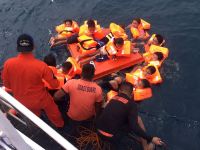A suicide bomber attacked fighters opposed to the Islamic State of Iraq and Syria (ISIS) extremist group as they gathered Wednesday to receive salaries south of Baghdad, killing at least 33 people and wounding 55 others, Iraqi police and medical officials said.
"The attacker was wearing an Iraqi army uniform, and an explosive vest packed with ball bearings," a police officer said.
The attack was on a group known as Sahwa, or "Awakening" in Arabic, which dates back to the height of the US-led war in Iraq, when tribesmen joined forces with the Americans to battle insurgents including ISIS's predecessor organization, the Islamic State of Iraq.
Recently, the Iraqi government began distributing arms and ammunition to tribesmen and other groups, including Sahwa, as Prime Minister Haidar al-Abadi seeks to establish an anti-ISIS national guard made up of local fighters.
The dead were mostly anti-ISIS fighters, but included at least three soldiers, Iraqi officials said.
There was no immediate claim of responsibility for the attack, but suicide bombings are a tactic almost exclusively employed by extremist groups in Iraq, including ISIS.
ISIS declared what it calls a cross-border Islamic ‘caliphate’ on large swathes of land it captured in Iraq and Syria, targeting ethnic and religious minorities in particular, as well as anyone who opposes the group’s ideology.
Over the past weeks, the Iraqi army, backed by Kurdish forces, volunteering fighters and tribesmen have clawed back some ground from ISIS, inflicting a string of defeats on the jihadists.
However, major areas, especially north and west of Baghdad, remain outside government control.
The United States, backed by some Western and Arab allies, has also been targeting ISIS since August and has so far billed Iraq 260 million dollars, despite failure to stop the advance of militants.
Critics opposed to US involvement in the conflict with ISIS have pointed out that Washington in partnership with its Gulf allies, including Saudi Arabia, played a role in the formation and expansion of extremist groups like ISIS by arming, financing and politically empowering armed opposition groups in Syria and Libya.
The expansion of extremist groups, especially ISIS, in Iraq, raises questions about the effectiveness of the so-called US "war on terror" launched by the Bush administration after the 9/11 attacks, which included the US invasions of Iraq and Afghanistan.
On the contrary, the campaign in general and the US invasion of Iraq in particular have served as a recruitment tool for terrorist groups, such as ISIS, as figures show that violence rose precipitously in Iraq since 2003.








